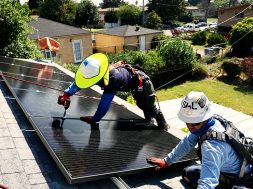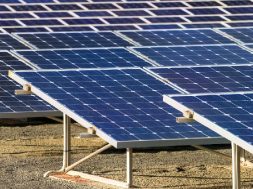
Solar power plants installed only in 3.75% of residential houses
For any new building coming up in Chandigarh, a solar power plant has to be installed on the roof. In this case, a no-objection certificate from the estate office is not given until a solar power plant is installed.
ALTHOUGH THE last date of installing solar power plants expired on Friday, only 3.75 per cent of private residential houses have got them installed.
All the existing buildings had to get the solar power plants installed on the roof, latest by May 18. These were to be installed only on a plot size of 500 square yards and above. A notification in this regard was issued on May 18, 2016. With around 6,000 houses of plot size 500 sq yrds, only 225 have been installed as of now, according to the Chandigarh Renewable Energy Science and Technology (CREST).
“Around 700 of the applicants, however, are in the process of getting them installed,” said a senior CREST official.
As far as government houses are concerned, only 70 have installed the solar power plants. There are still 118 of them, above 500 sq yards, which have not got these installed.
A total of 269 government institutions, including police stations, colleges, ISBT sectors 17 and 43, schools and colleges, have solar power plants. With not much compliance, Santosh Kumar, the CEO of CREST, said it is the estate office which would issue notices to people. “If the compliance is not made despite receiving notice, electricity connection could be disconnected and further resumption notice can also be sent,” added another official.
As 118 government houses have not got the solar power plants installed, tenders have been floated for installation of the same.
The solar panels are installed on rooftops to generate electricity. The power generated is used to run appliances such as fans, lights and air conditioners. After the power generated is used by a consumer, the remaining electricity is sent to the grid. A plant’s life is generally up to 25 years and cleaning is required every 15 days.
A person with a residential plot of 500 sq yards up to 999 sq yards will have to install a solar power plant of 1 KW peak while those whose plot size is 1,000 sq yards to 2,999 sq yards, will have to install a plant of up to 2 KW peak and those with 3,000 sq yards and above, 3 KW peak.
A 1 kwp solar power plant will cost around Rs 60,000 and the consumer would get nearly 30 per cent subsidy from the government on this, that is Rs 18,000. So, the total cost an applicant has to shell out from his own pocket would be Rs 42,000.
According to norms, all private schools, colleges, hostels, which have a connecting load of 30 kilowatt and above, will have to install a solar power plant of 5 KWP. All government buildings and offices, government colleges having a connecting load of 30 kw and above will have to install a solar plant of minimum 2 KWP.
All private hospitals or nursing homes, hotels, industrial establishments, malls, commercial establishments, banquet halls and other buildings that have a connecting load of 50 kilowatt to 1,000 kilowatt will have to have a solar power plant of minimum 10 KWP.
All new buildings developed by group housing societies, builders, housing boards on a plot size of 0.5 acre to 1 acre will have to install a solar plant of minimum 10 KWP, those with more than 1 acre to 2 acres – 20 KWP, more than 2 acres to 5 acres – 30 KWP, and more than 5 acres – 40 KWP. Existing housing complexes developed by group housing societies, builders and housing boards are exempted from the mandatory installation.
For any new building coming up in Chandigarh, a solar power plant has to be installed on the roof. In this case, a no-objection certificate from the estate office is not given until a solar power plant is installed.













